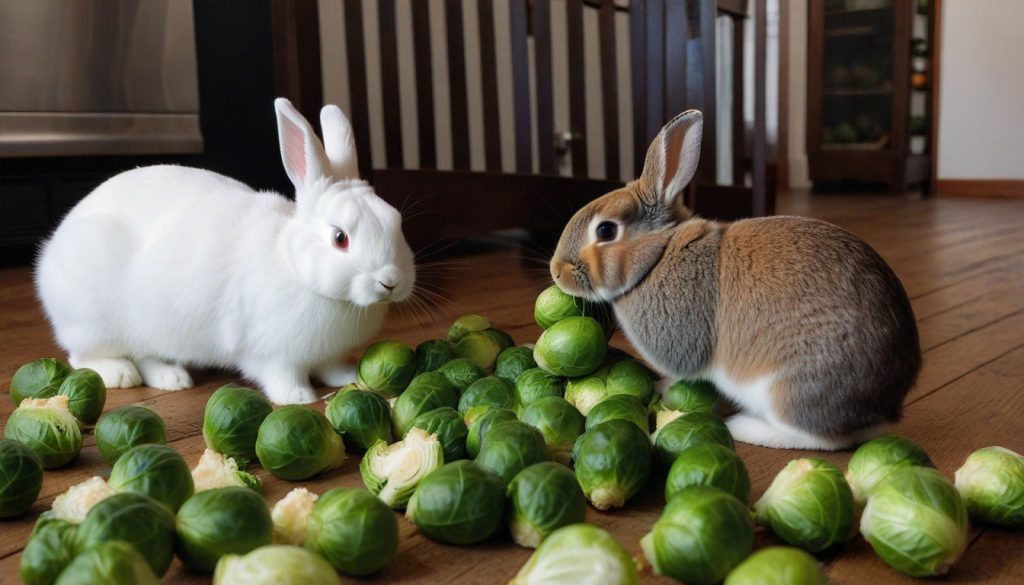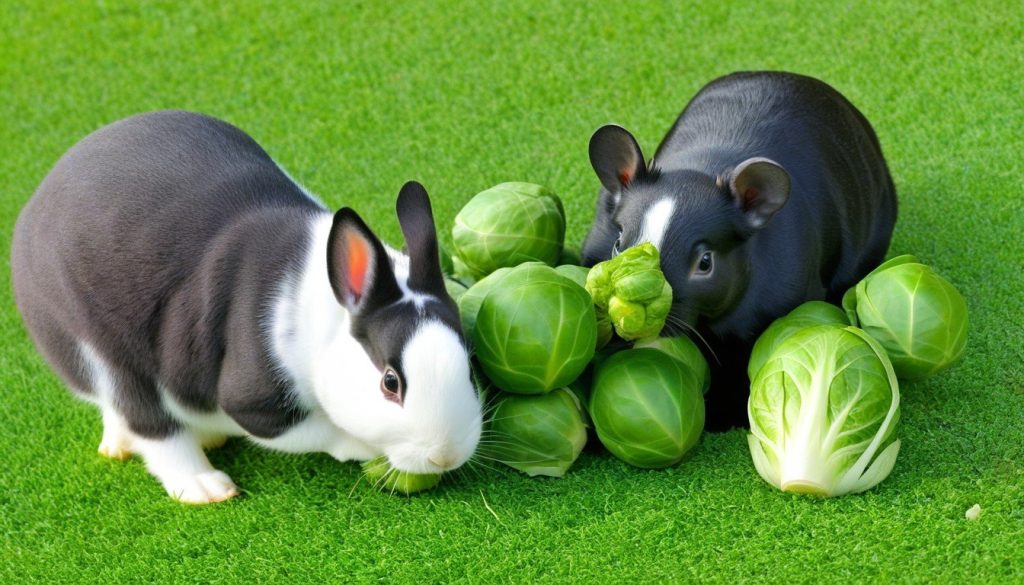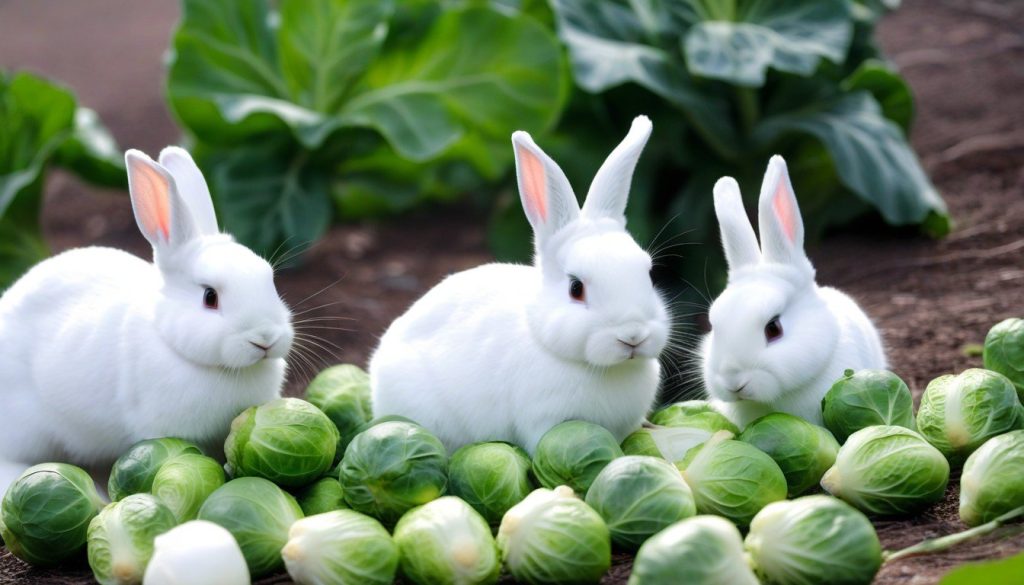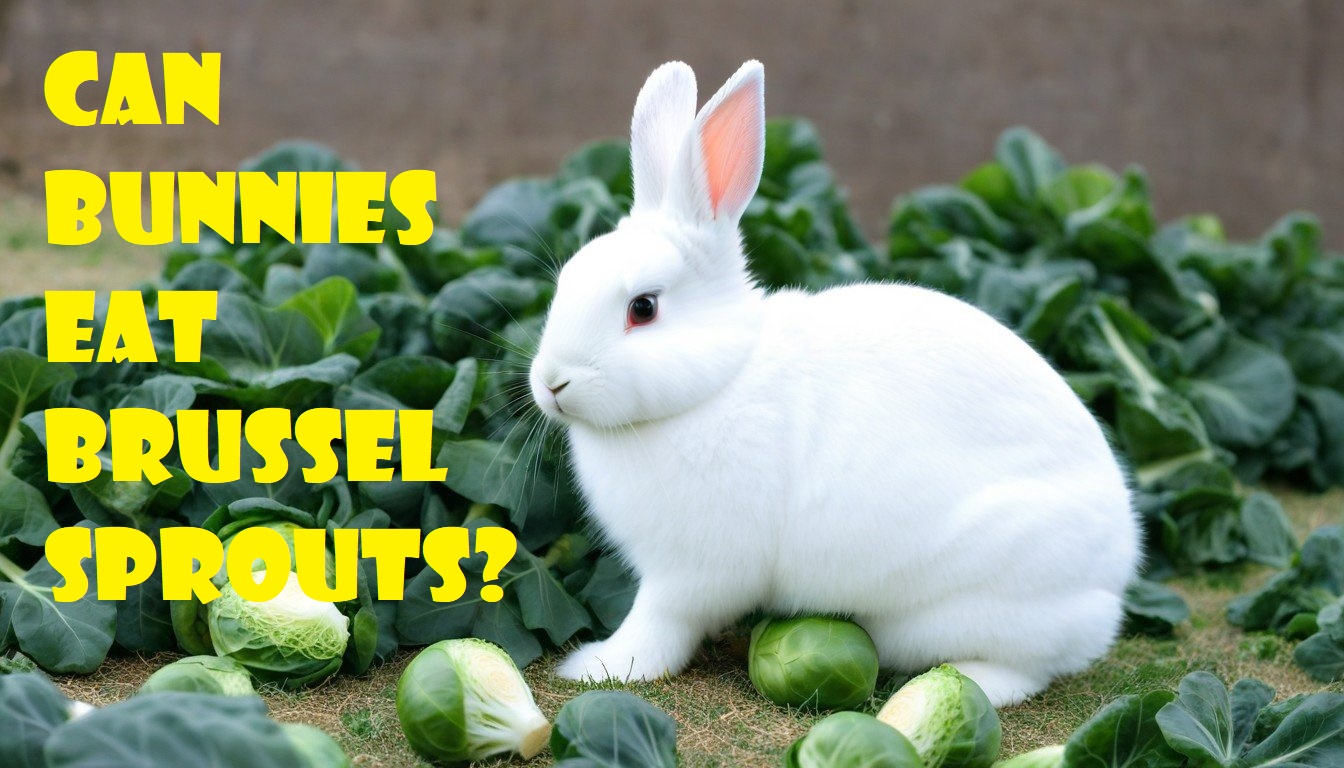Can Bunnies Eat Brussel Sprouts? This is a common question among bunny owners, and for good reason. As pet parents, we want to ensure our furry friends get the best nutrition possible. With the popularity of Brussels sprouts as a healthy and nutritious vegetable, many wonder if it is safe to feed them to their bunnies.
In this blog post, we will explore the Question Can Bunnies Eat Brussel Sprouts? benefits of Brussels sprouts for bunnies, feeding tips, potential drawbacks, and more.
So, if you’re curious whether your bunny can enjoy this leafy green, keep reading to find out. Spoiler alert: the answer may surprise you!
Also, Did you know Can Rabbits Eat Dried Apricots? Find here!!!
Can Bunnies Eat Brussel Sprouts?
Can Bunnies Eat Brussel Sprouts? The answer is Yes, bunnies can eat Brussel sprouts, but with caution. Brussels sprouts, like other cruciferous vegetables, contain a high level of nutrients that benefit your bunny’s overall health. However, Brussels sprouts contain compounds that can cause gas and bloating in bunnies if fed in large amounts.
For this reason, Brussels sprouts should be introduced slowly into your bunny’s diet and should only be given as a small part of their overall balanced diet. It’s best to start by offering your bunny a small piece of Brussels sprouts and closely monitor their reaction. If your bunny enjoys the taste and doesn’t experience any adverse effects, you can slowly increase the amount.
However, ensure it doesn’t become the central part of their diet. Remember, while Brussels sprouts can supplement your bunny’s diet, a diet based primarily on hay is crucial for a bunny’s digestive health and dental care.

Nutritional Value of Brussels Sprouts for Bunnies
Brussels sprouts are packed with various essential nutrients that bunnies can benefit from. They are a good source of vitamins such as Vitamin K, C, and A.
Vitamin K is crucial for blood clotting and bone health, while Vitamin C aids in growth and development and repairing body tissues. Vitamin A, on the other hand, is essential for good vision, immune system, and reproductive health. They also have a substantial amount of dietary fiber, aiding digestion.
Besides, Brussels sprouts contain minerals like potassium, phosphorus, and calcium that are key to your bunny’s health. Potassium is crucial for maintaining a healthy nervous system and regular heart rhythm, phosphorus is for strong bones and teeth, and calcium is for proper growth and maintenance of bones. Moreover, Brussels sprouts have a high water content that can help keep your bunny hydrated.
However, it’s important to remember that while these nutrients are beneficial, Brussels sprouts should only make up a small portion of your bunny’s diet. Your bunny’s primary diet should consist mainly of hay, fresh water, and bunny-specific pellets.
Health Benefits of Brussels Sprouts to Bunnies
Let’s delve into some of the vital health benefits of Brussels sprouts for bunnies:
Boosts Immunity:
The Vitamin C content in Brussels sprouts can help bolster your bunny’s immune system, aiding in the prevention of diseases.
Supports Bone Health:
The amount of Vitamin K in Brussels sprouts helps maintain strong and healthy bones, reducing the risk of fractures.
Enhances Vision:
The Vitamin A found in these leafy vegetables is crucial for maintaining good eyesight in your bunny, promoting overall eye health.
Aids Digestion:
Brussels sprouts are rich in dietary fiber, which supports the digestive system of bunnies, helping to prevent digestive issues such as constipation.
Helps Maintain Hydration:
The high water content in Brussels sprouts can assist in keeping your bunny well-hydrated, contributing to overall health.
Maintains Cardiovascular Health:
Potassium in Brussels sprouts helps regulate your bunny’s heart rhythm, promoting cardiovascular health. Feeding your bunny Brussels sprouts can offer these health benefits and improve their overall wellbeing.
However, moderation is key, ensuring that Brussels sprouts are just a tiny part of a balanced diet, not the main course.

Potential Drawbacks of Brussels Sprouts for Bunnies
- Oxalic Acid Content: Brussels sprouts contain oxalic acid, which, in excess, can interfere with calcium absorption and contribute to bladder issues or the formation of urinary stones in rabbits.
- Gas and Digestive Upset: Brussels sprouts, like other cruciferous vegetables, can cause gas and digestive discomfort in some rabbits, leading to bloating or gastrointestinal disturbances.
- Moderation Required: Feeding Brussels sprouts in large quantities can upset a rabbit’s sensitive digestive system due to their high fiber content. Moderation is crucial to avoid digestive issues.
- Potential Allergies or Sensitivities: Some rabbits might have allergies or sensitivities to Brussels sprouts, leading to adverse reactions such as diarrhea or gastrointestinal upset.
- Pesticide Residues: Brussels sprouts may contain pesticide residues that can harm rabbits if not properly washed. To avoid potential toxicity, it’s essential to thoroughly clean them before feeding them to your bunny.
Practical Feeding Tips for Giving Brussels Sprouts to Bunnies
Here are some practical tips for feeding Brussels sprouts to your bunnies:
- Introduction in Moderation: Start by gradually introducing small amounts of Brussels sprouts into your rabbit’s diet. This helps their digestive system adjust and prevents potential digestive upset.
- Freshness and Preparation: Always opt for fresh Brussels sprouts. Wash them thoroughly to remove any pesticides or dirt before serving. You can chop them into smaller, manageable pieces for your bunny.
- Moderation is Key: Offer Brussels sprouts as an occasional treat rather than a regular part of their diet. Too much can lead to digestive issues due to their high fiber content and oxalic acid levels.
- Observation: Monitor your bunny’s reaction after introducing Brussels sprouts. Watch for any signs of digestive discomfort, such as changes in stool consistency or reduced appetite. If any issues arise, limit or eliminate Brussels sprouts from their diet.
- Variety in Diet: Remember to provide a balanced diet for your bunny. Brussels sprouts should be just one of several vegetables offered to ensure a diverse intake of nutrients. Their primary diet should consist of hay supplemented with fresh vegetables, limited pellets, and fresh water.
- Remove Uneaten Portions: If your bunny doesn’t finish the Brussels sprouts within a few hours, remove the uneaten portions to prevent spoilage and bacterial growth.
- Consult a Vet: If you need more clarification about feeding Brussels sprouts to your bunny or if your rabbit has any health issues, consult a vet specializing in rabbits for personalized advice on their diet and nutrition.
Following these tips, you can safely incorporate Brussels sprouts as an occasional and enjoyable addition to your bunny’s diet while ensuring their health and wellbeing.

Are Cooked Brussels sprouts Safe For Rabbits?
It’s best to avoid feeding your rabbit-cooked Brussels sprouts. Cooking reduces the nutritional content of these leafy vegetables and changes their texture, making them potentially tricky for your bunny to eat and digest.
Moreover, cooking can sometimes involve using oils, seasonings, or other additives that could harm your bunny’s health. Some of these additives may cause digestive upset or even toxicity in bunnies.
Additionally, cooked Brussels sprouts can become a choking hazard if they’re too soft. Thus, feeding your bunny raw Brussels sprouts is always the safest and most beneficial. Remember, always thoroughly wash the sprouts before serving them to ensure any pesticide residues or dirt are removed.
As always, moderation is key. Introduce raw Brussels sprouts slowly into your bunny’s diet and observe their reaction to ensure it’s a safe and enjoyable addition to their meals.
Types of Brussel Sprouts You May Feed Your Rabbit
When it comes to feeding Brussels sprouts to your rabbit, the type doesn’t significantly matter as long as they’re fresh and pesticide-free. However, some common varieties of Brussels sprouts include:
- Standard Brussels Sprouts: These are the most common type in grocery stores. They have small, round green heads along a stalk.
- Red Brussels Sprouts: These are a variation with a reddish-purple hue. They offer a similar nutritional profile to green Brussels sprouts.
- Baby Brussels Sprouts: These are smaller and more tender versions of regular Brussels sprouts. They might be easier for rabbits to chew and digest due to their size and tenderness.
Regardless of the variety, ensure they’re fresh, thoroughly washed, and offered to your rabbit in small, manageable portions to avoid any potential digestive issues.
Healthy Alternatives to Brussel Sprouts
Suppose Brussels sprouts don’t sit well with your bunny; fret not. Other vegetables can provide comparable nutrients without potentially causing digestive upset. Green leafy veggies like kale, spinach, and romaine lettuce are excellent alternatives. They’re packed with fiber, vitamins, and minerals; most bunnies enjoy their taste. Bell peppers, rich in vitamin C, can add color and flavor to your bunny’s diet.
Carrots, rich in vitamin A, should only be given in moderation due to their high sugar content. Herbs like basil, parsley, and cilantro can be enjoyed as well. Always wash these alternatives thoroughly before serving and introduce them gradually into your bunny’s diet. With various options, your bunny can still relish nibbling on veggies while reaping health benefits.
FAQs
What quantity of Brussels sprouts is safe for bunnies?
A small piece once or twice a week is generally sufficient.
Can bunnies eat cooked Brussels sprouts?
Raw Brussels sprouts are not recommended as cooking can reduce nutrient content and pose a choking hazard.
Can Bunnies Eat Brussel Sprouts?
Yes, bunnies can eat Brussels sprouts. However, it’s vital to exercise caution while feeding these leafy greens to your furry friend. Introduce them gradually, and constantly monitor your bunny for any adverse reactions. Remember, Brussels sprouts should only be a small addition to their diet and not replace the essential staples of hay, fresh water, and bunny-specific pellets.
While Brussels sprouts can be a nutritious treat, they must be given in moderation to maintain a balanced diet for your bunny.
How many Brussels sprouts can a rabbit eat?
The quantity of Brussels sprouts a bunny can eat depends on their size, but generally, a small piece of Brussels sprouts is sufficient once or twice a week.
They should consume at most a teaspoon-sized serving in a single meal. Remember, Brussels sprouts are just a treat and should not dominate your bunny’s diet, which is mainly of hay supplemented by fresh water and bunny-specific pellets. y
Always observe your bunny’s reaction after feeding Brussels sprouts and adjust the portion size if necessary.
Can rabbits eat Brussels sprouts raw?
Yes, rabbits can eat raw Brussels sprouts. In fact, natural is the preferred way to serve Brussels sprouts to your bunny. Cooking Brussels sprouts can reduce their nutrient content, making them less beneficial for your rabbit.
Furthermore, cooked Brussels sprouts can pose a choking hazard and potentially contain harmful additives. Always thoroughly wash raw Brussels sprouts to remove pesticides or dirt before serving your rabbit.
Can bunnies eat broccoli?
Indeed, bunnies can enjoy broccoli, but as with Brussels sprouts, moderation is essential. Broccoli contains vital nutrients like vitamins K, C, and A, fiber, and minerals. It can aid in boosting immunity, supporting bone health, and promoting digestion.
However, too much broccoli can lead to gas and bloating due to its high fiber content. It’s best to gradually introduce broccoli into your bunny’s diet, offering small pieces and observing any changes. Remember, broccoli should be an occasional treat, not a staple, as hay remains the core of a healthy bunny diet.
Conclusion
In conclusion, the question “Can bunnies eat Brussel sprouts?” has a positive answer, albeit with a cautionary note. Brussels sprouts provide many benefits to your bunny’s health, including boosting immunity, supporting bone health, enhancing vision, aiding digestion, and more.
However, moderation is vital to avoid potential drawbacks like gas, digestive upset, and bladder issues. It’s essential to gradually introduce Brussels sprouts into your bunny’s diet, monitor their reaction, and ensure it’s not the main component of their diet.
While Brussels sprouts can be a nutritious occasional treat, remember that hay should remain the central part of their diet. Also, always consult a vet if you have doubts about your bunny’s diet and nutritional needs.
With the right approach, Brussels sprouts can be a healthy addition to your bunny’s dietary routine, promoting wellbeing and satisfaction.

